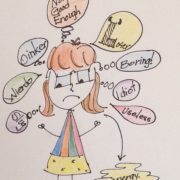Humans are a problem solving species. We are wired for it, beginning perhaps with the evolutionarily imperative to find food. And boredom is a problem we are driven to solve.
In modern times, boredom can mean many things. Generally there are plenty of things to do, just nothing you want to do, or feel like doing. It’s the uneasy feeling of being unstimulated with nothing to occupy your mind. It’s one reason social media thrives. It’s the fastest feel-good balm we can turn to for that ping of instant gratification.

What Does Being Bored Mean For You?
Let’s explore that. Is it that you need a problem to solve? Problems aren’t always negative, and our minds tend to run in this direction. We are always solving problems! What’s for dinner? How fast can I get this paper written? How do I get my supervisor to understand the need for my budget request? Do I need to take the dog for a walk? How do I make the topic of boredom more compelling? Having an interesting challenge before you is stimulating.
Here are three ways to check in and identify whether or not you are bored.
- You have difficulty paying attention to the internal information (e.g., thoughts or feelings) or external information (e.g., environmental stimuli) required for participating in satisfying activity
- You’re aware of the fact that you are having difficulty paying attention
- You believe that the environment is responsible for your aversive state such as, “this task is boring,” or “there is nothing to do”
What’s Underneath Your Boredom?
Is there an underlying depression, perfectionism or a feeling of inadequacy that you are avoiding or suppressing, to name a few possibilities? Self-loathing, boredom and isolation are often pretzeled together. Addiction can be an outcome of boredom. Addictions can take many forms: Online gaming, alcohol, drug abuse, marijuana, social media, over-sleeping, gambling, shopping, binge watching TV and eating hits the top ten. Each addiction is similar in purpose. They are all forms of numbing, avoiding and/or distraction.
Addictions are all similar in purpose. Each one is a form of numbing, avoiding and/or distraction.-Page Rutledge, LCSW
Fix Me
Sometimes when I see people in this state, they come in to the room with an unspoken mandate—almost a plea—that implies “fix me!” My response is going to be “What do you want? What do you value? What are the benefits you are getting from your current behavior? Are you making choices that support what you say you value? How can you live in step with your values instead of choosing avoidance through addiction?”
Generally when when someone complains about boredom, it’s not so much about “boredom” as it is about “non-distracted time”. Exploring the craving for that distraction and what you are trying to distract from is a useful place to start. Sometimes it may feel like a hard-to-put-your-finger-on existential drive to discover a more meaningful life.
How To Harness Your Boredom
Don’t waste your boredom. Use it to your advantage. Boredom can give birth to creativity. Alex Lickerman, MD, a physician and practicing Nichiren Buddhist posits that there is nothing that is intrinsically boring. There are examples of prisoners of war, sitting in complete isolation, who are able to focus their minds and find interesting things to prevent boredom. Here’s what he does to reduce his experience of boredom:
“Whenever I’m bored, I try to ask myself three questions:
1. How can my current circumstances help me develop myself?
2. How can my current circumstances help me contribute to the happiness of someone else?
3. How would the wisest person on earth look at my current circumstances, and what would he or she do in my stead?”—Alex Lickerman, MD
Existential Meaninglessness
Anhedonia is the term psychiatrists use for the inability to derive pleasure from activities you once enjoyed. It remains one of the hallmarks of depression, but it’s entirely possible to experience anhedonia from another cause: a sense that life is meaningless. If you feel strongly there’s no ultimate point to being here, it’s hard to feel purposeful about doing anything. And it’s hard, if not impossible, to be interested in something you feel has no purpose. Choosing service to others in some form is one option can lessen your tendency to ruminate and remain in internal mode. It gets you out of your head and into life.
How Do You Become Interested Again?
When the black dog of depression hangs over you, this can seem daunting. Since depression is the “do nothing disorder” small gradual, doable, action steps tend to work best. Figuring out the smallest changes you can commit to on a daily basis is helpful. Then you can gradually build on those small successes. There is much truth to “Success begets success.” You may believe that you are powerless to solve your problems, but you are not. Wouldn’t it be interesting if you figured out A) How to solve your problem or B) That you no longer need to solve that particular problem, or C) There is really a different problem to solve, AND you have the ability to do so.
Expect the process to be comprised of both successes and setbacks, but know that the overall journey can take you to a much more satisfying life. Often people don’t understand that it is actually the challenge, or the problem 😉 that leads to happiness. After all, happiness is simply the (very pleasant) byproduct, not the actual goal.
Contact me here if you are ready to move forward out of your stuck place. A good read on the subject is The Ten Worlds: The New Psychology Of Happiness by Alex Lickerman, MD (2018).











